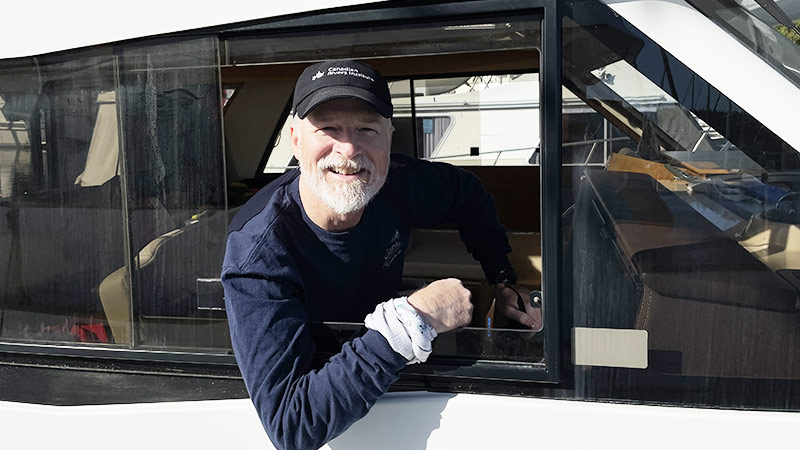A UNB professor’s ‘pre-retirement’ journey around North America by boat
Author: Kathleen McLaughlin
Posted on Jul 18, 2023
Category: UNB Saint John , UNB Fredericton

People dream of doing things like travelling around North America by boat when they retire – heading off into the sunset once their work is done. For Allen Curry, it will be his last project before he retires as he embarks on a year-and-a-half trip on the continent’s eastern rivers, lakes and ocean coastline that will bring attention to water issues in communities along his route.
The trip, also known as the Weaving Waters Expedition, was inspired by Rachel Carson’s book Silent Spring and aims to address global water issues by building water reconciliation stories through science and local knowledge.
Published in 1962, Carson’s book set the stage for the establishment of the United States’ Environmental Protection Agency in 1970, which regulated the use of pesticides in 1972. Her ground-breaking book, written for a general audience, informs readers about the dangerous, long-term effects of human-made chemicals in the environment, like spraying pesticides on crops.
“About a year ago, I had an idea to go on this expedition as a retirement project,” said Curry. “I knew I wanted to wrap up my career in water sciences in a way that was impactful. So, I decided to create a collection of stories that address various water issues from the ground up and inform people in the same way as Silent Spring did.”
Curry began his journey on Water Weaver, a 2016 Cutwater C30 Sedan boat, on Sunday, July 16. The trip is a funded initiative by the Canadian Rivers Institute at the University of New Brunswick (UNB).
The year-and-a-half-long trip is a connecting-of-dots project. On his travels, Curry will meet people on their home waters, listen and learn, discuss the science and their experiences, weaving them into a collective, water reconciliation message.
Each of the 45-plus stops along the way holds close ties to global water issues, such as plastic, pollution and contamination of the environment, aquatic life protection and water quality.
One notable stop will be New Orleans, Louisiana, which was hard hit by Hurricane Katrina. The historic, category three hurricane left an environmental toll with oil spills, storm debris, damaged sewage and water treatment systems, abandoned housing, and widespread health issues in 2005.
“Most people find it difficult to understand global issues like climate change or the Canadian Environmental Protection Act,” said Curry.
“What they can grasp is their water no longer being suitable to swim, drink or fish in. By collecting these first-person stories, my plan is to demonstrate that we all agree there are widespread, mutual problems and we must work together to find better ways to live with our water.”
Beginning in Stoney Creek, a community in Hamilton, Ontario, and one of Canada’s most industrialized and impacted harbours, Curry will take the Water Weaver through the Welland Canal, into Lake Erie, Lake Huron, Lake Michigan and down the Mississippi River. From there, he will head to the Gulf of Mexico, around Florida and back up the Atlantic Ocean coast to Lake Ontario, down the St. Lawrence River and will end his voyage in Fredericton in 2024.
“Dr. Curry's Weaving Waters odyssey will bring broader attention to timely and relevant environmental matters that impact aquatic systems,” said Michelle Gray, director of the Canadian Rivers Institute. “This is his brainchild, and what a fitting way to cap off his exemplary career as an aquatic ecologist and scientist. All of us at the Canadian Rivers Institute envy him for this epic adventure and wish him safe and smooth sailing.”
Curry is a professor of biology, forestry, environmental management, and recreational fisheries at UNB and a natural historian of Canada’s rivers and lakes, coastal zones and oceans. Although his academic career can be defined by world-class research and science, many of his achievements include his work with discoveries that have come from local experts in their local communities and Indigenous Elders.
“Dr. Curry’s academic career has been a formidable and impactful one, and I look forward to seeing the outcomes of this important, awareness-raising voyage," said Dr. David McGee, UNB’s vice-president of research. “Fair winds and following seas, Allen.
At the end of the Weaving Waters Expedition, Curry will write about his encounters with local water people, the final chapter of his 30-year career at UNB. He hopes this project will impact society on a broader level by bringing together community voices and science in the same way as Rachel Carson.
“I’ve got the wealth of environmental scientific experience and this community behind me, now it's time to meet local people and hear their stories, combine the two and tell the bigger yet common story to all of society,” said Curry. “People share these water concerns, and my plan is to facilitate the connection among people and their stories to help build better solutions and a future for the environment and our children.”
Follow along with the Water Weaver Expedition.
Learn more about Allen Curry’s research.
